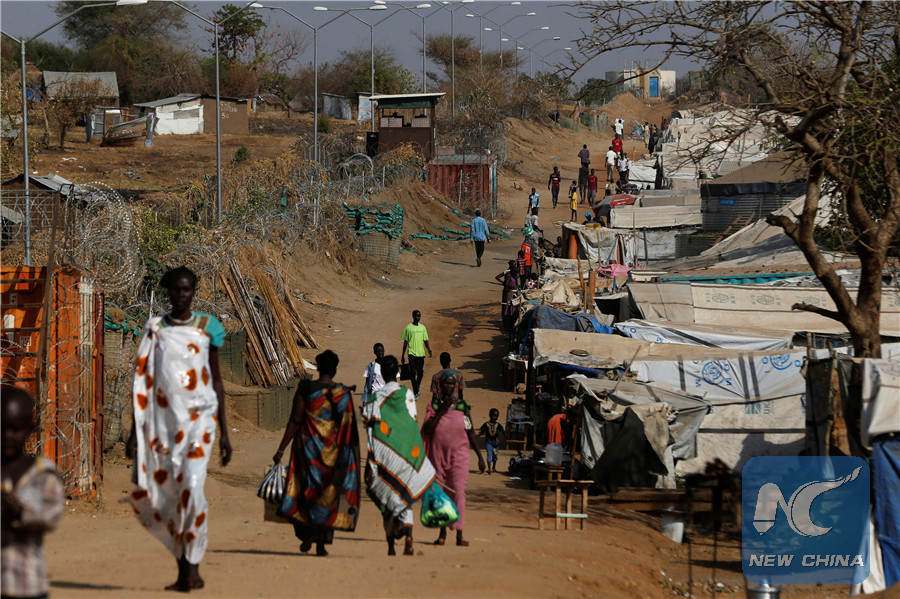
Internally displaced people walk on a road close to the outer perimeter of a United Nations Mission in South Sudan (UNMISS) Protection of Civilian site (CoP), outside the capital Juba, South Sudan, January 25, 2017. (Reuters photo)
KHARTOUM, Feb. 22 (Xinhua) -- Official Sudanese statistics indicate that the number of homeless children in the capital Khartoum alone tops 6,000, while some organizations set the number at 13,000.
The homeless or street children are suffering from miserable conditions and they are living in streets, abandoned buildings, tunnels and sewers, besides that they are exposed to physical and psychological abuse, not to mention that they do not have access to education.
Mujaddidon Organization, a Sudanese NGO, established an open street school on the Nile Avenue in the Sudanese capital Khartoum targeting mainly street children or homeless children. The organization attracts these children to join the open school in return for provision of meals for them.
"The project tends to rehabilitate the category of street children, educate them, reintegrate them in the society and find them job opportunities," Faris Alnur Ibrahim, chairman of Mujaddidon Organization, told Xinhua on Wednesday.
"We started with this category using different means to attract them, where we first adopted the policy of motivation by food, and when we received response from them, we established the open school," he explained.
He went on saying that "the school is formed of a black board and chairs in the open on the side of the street. We have successfully attracted the homeless children to join the school via the food for education strategy."
He said the majority of the homeless children who joined the open school were addictive to sniffing glue, a petrochemical material used in fixing bicycle wheel tubes. These children sniff the glue as a substitute for drugs because it is inexpensive and easier to obtain.
"The majority of these homeless children are addicted to glue sniffing and they live in tunnels. We are seeking to establish a camp for accommodating around 400 children. The purpose is to keep them with us for the longest possible period so that we can help them quit addiction of glue sniffing," he noted.
Kauthar Bakry Siddiq, a teacher at the open school, told Xinhua that "when we began teaching these homeless children we faced difficulties at the beginning as they were street children and addicts. We used to be afraid of them, not to mention the nasty smell of the sniffing glue which emits from them."
"Gradually we have learned how to deal with them and managed to convince them to stop glue sniffing during the classes period. Presently there is a wide response and we have become part of them. In fact we have managed to change much negative behavior," she added.
Meanwhile, Mahmoud, one of the homeless children who joined the open school, believes that great change has taken place in his life since he joined the open school.
"I have learned much here. I have learned mathematics. I have learned how to write and read, and some English language," he told Xinhua.
"We used to live in the street, but now we receive education at the open school. We used to live in the sewers, but now we will move to a camp near the Nile bank. We thank Mujaddidon Organization for the services it provides to us," he added.
The open school started two months ago and presently it is accommodating 110 students from the street children across the Sudanese capital Khartoum.
Despite the efforts been exerted by the official Sudanese concerned authorities, the phenomenon of homeless children in Sudan is still continuing, which pushed many trends to demand finding a different methodology to address it together with its causes and to limit its negative consequences.
Experts attribute the phenomenon of homeless children to the ongoing wars in Sudan, particularly at Darfur, South Kordofan and Blue Nile regions in addition to the economic conditions in the country.

